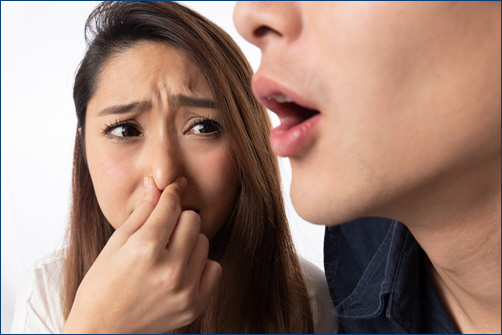Bad breath, medically known as halitosis, is a common issue that can affect your confidence and social interactions. It’s often caused by a variety of factors, ranging from poor oral hygiene to underlying health conditions. Understanding the causes and solutions for bad breath can help you maintain fresh breath and good overall oral health.
Common Causes of Bad Breath
 Poor Oral Hygiene: The most common cause of bad breath is inadequate brushing and flossing. Food particles and plaque buildup on the teeth and tongue can lead to bacterial growth and unpleasant odors. Regular cleaning is essential to prevent these issues.
Poor Oral Hygiene: The most common cause of bad breath is inadequate brushing and flossing. Food particles and plaque buildup on the teeth and tongue can lead to bacterial growth and unpleasant odors. Regular cleaning is essential to prevent these issues.- Diet and Food Choices: Certain foods, like garlic and onions, contain compounds that can contribute to bad breath. Additionally, a diet high in sugar can promote bacteria growth in the mouth. Avoiding these foods or maintaining good oral hygiene after consuming them can help mitigate their effects.
- Dry Mouth: Saliva helps cleanse the mouth and remove particles that cause bad breath. Dry mouth, often caused by dehydration or certain medications, can reduce saliva production, leading to persistent bad breath.
- Gum Disease: Periodontal disease, which involves inflammation and infection of the gums, can result in chronic bad breath. Gum disease is often characterized by red, swollen gums that bleed easily and may require professional treatment.
- Underlying Health Conditions: Conditions such as sinus infections, respiratory infections, or gastrointestinal issues can also cause bad breath. It’s important to consult a healthcare provider if bad breath persists despite good oral hygiene practices.
Prevention Strategies
- Maintain Good Oral Hygiene: Brush your teeth twice daily with fluoride toothpaste and floss at least once a day. Don’t forget to brush your tongue, as bacteria can accumulate there.
- Stay Hydrated: Drink plenty of water throughout the day to help maintain saliva production and keep your mouth moist.
- Use Mouthwash: An antimicrobial mouthwash can help reduce bacteria and freshen your breath. Choose a product with antibacterial properties and avoid those with high alcohol content, which can dry out the mouth.
- Regular Dental Checkups: Visit your dentist regularly for checkups and professional cleanings. Your dentist can help identify and address any underlying issues contributing to bad breath.
Treatment Options
- Address Oral Health Issues: Treat any underlying conditions such as gum disease or cavities with the help of your dentist. Professional cleanings and treatments can significantly improve your breath.
- Adjust Your Diet: Avoid foods that contribute to bad breath and incorporate fresh, crunchy fruits and vegetables that help clean the teeth naturally.
- Chewing Gum: Sugar-free gum can stimulate saliva production and provide a temporary freshening effect for your breath.
Preventing and treating bad breath involves a combination of good oral hygiene, proper hydration, and addressing any underlying health issues. By implementing these strategies and maintaining regular dental care, you can effectively manage and improve your breath, ensuring that you feel confident in all your interactions.

